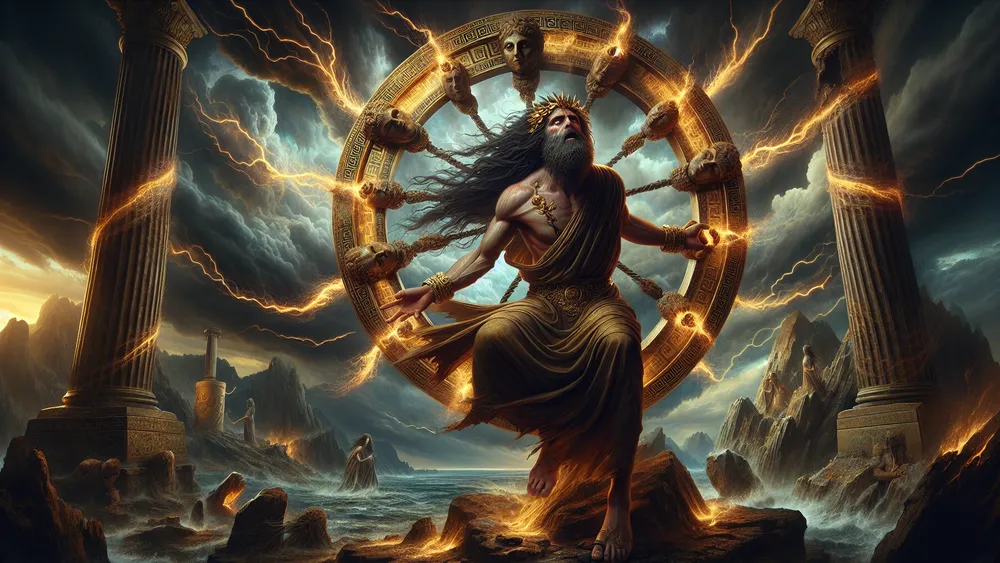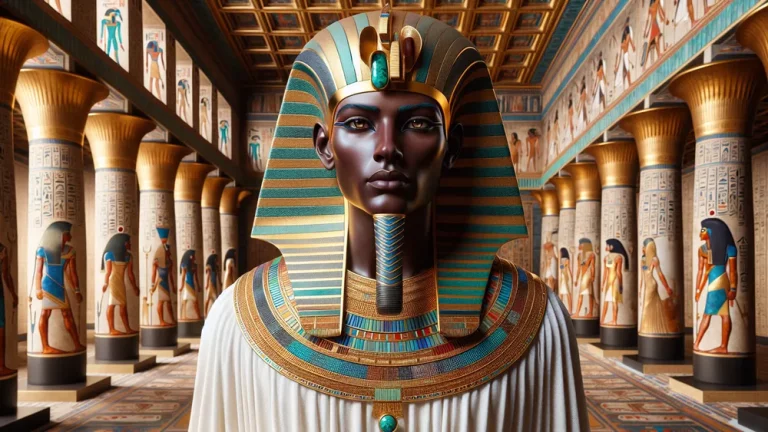Ixion: Greek Mythology’s King Of Lapiths And His Tragic Fate
Welcome to the interesting tale of Ixion, a figure from Greek mythology whose story is both sad and tells a lesson. Think of a king. Despite his noble family and at first gods liking him, he does many wrong things that lead to his forever punishment. Ixion, the king of the Lapiths, is such a person.
Key Points:
- Ixion is the King of the Lapiths in Greek mythology.
- His father is either Ares or Phlegyas, giving him noble roots.
- He killed his father-in-law, Deioneus, by pushing him into burning coals.
- Ixion was invited to Olympus by Zeus, showing a chance for redemption.
- He betrayed Zeus’s trust by trying to seduce Hera, leading to his punishment.
- Zeus punished him by tying him to a burning wheel for eternity.
- Ixion’s story warns about pride and the consequences of betrayal.
His story has themes of dishonesty, godly punishment, and the results of too much pride. We look into his story and see his beginnings, his well-known actions, and the tough penalty he got from Zeus. Whether you’re new to Greek myths or an old fan, this blog post will mean you understand Ixion’s life and legacy fully, providing a thorough understanding of his role in ancient stories.
Ixion: Overview and Key Facts
| Main Fact | Description |
|---|---|
| Name | Ixion |
| Title | King of the Lapiths |
| Parentage | Son of Ares (or Phlegyas) |
| Important Crime | Killed his father-in-law. He got exiles. |
| Divine Interaction | He was invited to Olympus by Zeus |
| Betrayal | Wanted to be with Hera, Zeus’s wife |
| Punishment | Tied to a hot, turning wheel forever |
| Symbolism | Means what happens when you are too proud and betray |
| Legacy | Came in later myths and cultural talks, especially in the Lapiths and Centaurs fight |
| Related Figures | Pirithous (son), Zeus, Hera, Centaurs, Lapiths |
Where Ixion Came From
To really get Ixion’s sad end, we need to look at where he came from and his early life. This means we see his family roots and how he first came to power.
Ixion’s Family Tree and Early Days
People talk about who Ixion’s father was. Some say Ares, the god of war. Others think it was Phlegyas, a king. Whether it was Ares or Phlegyas, Ixion was born with power and influence. Think of the pressure from gods or king duties. Like a prince today, he was expected to do much. He was the king of the Lapiths.
They were known to be brave. He was a good leader first. He kept order and people respected him. Gods liked him too. The land of the Lapiths had strong warriors and noble acts. Ixion ruled well at the start. People and gods saw him as a leader who could connect the divine and humans. But that promise was not lasting. His deeds later shocked both men and gods.

Ixion, born to either Ares or Phlegyas, began as a respected king of the brave Lapiths, but his later actions disappointed both people and gods.
The Bad Deed Ixion Did
Ixion’s fall started with a terrible crime against his father-in-law, Deioneus. He shocked everyone by betraying him. He asked Deioneus to a meal, pretending he wanted to make peace. But instead of fixing things, Ixion pushed Deioneus into burning coals and killed him.
He didn’t just betray Deioneus; he broke the special guest-host rules called “xenia,” very important in old Greek society. Think of betraying family or a good friend today. That crime caused Ixion to be sent away since no one wanted to clear him of his wrong. He became an outcast and a rejected person. Ixion’s actions were serious in Greek culture and stories.
Killing a family member, especially in a sneaky way, was one of the worst things you could do. It messed up the order of things and made the gods angry because they cared about justice. What Ixion did damaged his name and showed how bad things could get if you broke important rules.
His excessive pride, or hubris, took him from being respected to facing major consequences. It meant it’s very important to be humble and follow both godly and human rules in Greek tales.
Ixion’s Time with the Gods
Even though he did a serious wrong, Ixion’s story had a surprising change when he got a chance with the gods.
Ixion Gets an Invite to Olympus
Zeus, in a remarkable act of caring, had pity on Ixion even though he did something very wrong. He saw a chance for change and asked him to come to Olympus, the home of the gods. This was a big deal. It was like a powerful person giving a second chance to someone who messed up.
By giving this chance, Zeus meant the gods still trusted and could forgive, and it showed their ability to feel for others. This moment was crucial in Ixion’s story. He got a unique chance to make up for his past actions and join the gods.

Trying to Fool Hera
Even though he got divine mercy, Ixion’s pride made him break Zeus’s trust in a very bold way. While staying in Olympus, he liked Hera, Zeus’s wife, a lot and tried to win her over. This act is like a trusted worker trying to trick their boss by flirting with the boss’s partner. Zeus, who knew what Ixion planned, made a plan to expose him.
He made a cloud shaped like Hera, named Nephele, and showed it to Ixion. Ixion, thinking the cloud was Hera, showed what he really wanted and sealed his fate.
The results of Ixion’s actions were very serious and happened quickly. Zeus, very angry at the treachery, sentenced Ixion to an eternal punishment. This turned him from a person with a chance for redemption to one of endless suffering. Ixion’s story is a clear warning about the costs of pride and betrayal. Similar wrongdoings are seen in the stories of other myth characters who got punished for what they did:
- Tantalus: Punished for serving his son as a meal to the gods.
- Sisyphus: Sentenced to roll a rock up a hill forever for lying and tricking others.
- Prometheus: Chained and tortured for taking fire from the gods and giving it to humans.
These stories mean serious consequences for those who go against the gods and break important trusts.
The Punishment Ixion Faced
Ixion’s breaking of Zeus’s trust led to a punishment that was special and forever, which means how serious his wrongdoings were.
The Burning Wheel
Zeus came up with a special and forever punishment for Ixion that was both scary and symbolic. Ixion was tied to a burning, spinning wheel that was set on fire and rolled forever through the sky. This punishment is like the idea of endless pain, where the suffering never stops, and the person is stuck in an endless loop of pain.

The burning wheel was not just physical pain but also stood for Ixion’s never-ending guilt and the forever results of his treachery. The fiery wheel in Greek stories means a lot. The wheel stands for the repeating nature of punishment and the inescapable results of what one does. Fire, often linked with cleansing and divine payback, means the serious nature of Ixion’s crime.
Being tied to this wheel, Ixion’s punishment is a constant reminder of the gods’ power and the need to keep divine order. It also shows the idea of hubris – too much pride or self-confidence – that makes humans challenge the gods and face big paybacks.
To understand better how severe Ixion’s punishment was, look at the punishments of other mythological characters. Here is a table showing the different forms of endless pain created by the gods for those who did serious wrongs:
| Mythological Figure | Punishment | Description |
|---|---|---|
| Ixion | Burning Wheel | Tied to a burning, spinning wheel forever |
| Tantalus | Eternal Thirst and Hunger | Stood in a pool of water under a fruit tree, but could never drink or eat |
| Sisyphus | Rolling a Boulder | Made to roll a big stone up a hill, just for it to roll back down every time |
| Prometheus | Liver Eaten Daily | Chained to a rock where an eagle ate his liver every day, which grew back each night |
These examples mean the gods’ creative and often harsh ways of making sure that those who break divine laws face results that are both fitting and endless.
Ixion was punished by Zeus with a burning wheel that spins forever, symbolizing endless pain and guilt for his wrongs, highlighting the serious consequences of defying the gods.
How Ixion is Remembered in Myths
People have explained and told Ixion’s story again for a long time, which acts as a warning story about the dangers of too much pride and breaking trust. Ancient poets and writers often used his story to show the results of going against the gods and breaking their trust. For instance, in works by Pindar and Ovid, Ixion’s punishment is shown clearly, showing the moral results in his story.
Over time, his story has been changed and mentioned in different types of writing and art, similar to how historical events are changed to match modern contexts. This ongoing telling makes sure the lessons from Ixion’s fate stay important across generations. Ixion’s impact goes beyond his own story, affecting later myths and cultural mentions.
His story has similar events in other myths where people face severe results for their wrong actions, reinforcing ideas of gods’ justice. Also, Ixion’s tale has made its way into modern cultural mentions, standing for the idea of endless punishment and the unavoidable nature of what one does. For example, the idea of a “wheel of suffering” is seen in different books and art pieces, directly coming from Ixion’s myth.
This lasting legacy highlights the deep impact of his story on both ancient and modern stories.
Ixion’s Part in the Lapiths and Centaurs Clash
Ixion’s impact kept affecting things even a long time after his punishment, especially in the well-known fight between the Lapiths and the Centaurs.
The Story of the Lapiths and Centaurs
The Lapiths and Centaurs are two important groups in Greek myths, each with different beginnings and traits. The Lapiths were famous people from Thessaly. They were often shown as noble and civilized. They were strong and brave, traits that made other Greek tribes respect them.
But the Centaurs were creatures with the head, arms, and torso of a human and the body and legs of a horse. They were usually seen as wild and unruly, embodying untamed nature. The contrast between the Lapiths and Centaurs means the conflict between civilization and barbarism, a recurring idea in Greek myths.
Ixion’s indirect part in the famous clash between the Lapiths and Centaurs is rooted in what he left behind. As the father of Pirithous, the king of the Lapiths, Ixion’s actions and their results cast a long shadow over his descendants. The most notable event involving these two groups happened at the wedding of Pirithous.

The Centaurs, who were invited as guests, got drunk and tried to kidnap the bride and other female guests. This led to a violent clash known as the Centauromachy.
Although Ixion didn’t directly take part in this fight, what he did in the past indirectly influenced these events, highlighting the lasting effects of his actions on his lineage and their interactions with other mythological beings.
Pirithous’s Wedding Party
The wedding of Pirithous, son of Ixion, was meant to be a big celebration, getting many mythological characters together, including the Centaurs. Pirithous invited the Centaurs to promote peace between the Lapiths and their wild neighbors. But the party took a dark turn. The unruly Centaurs became drunk.
In their drunken state, they tried to kidnap the bride, Hippodamia, and other female guests. This led to a big fight between the Lapiths and the Centaurs, which turned into a full-scale battle known as the Centauromachy. The battle that followed was chaotic and brutal. Both sides suffered big losses.
The Lapiths, led by Pirithous and his friend Theseus, fought hard to protect their guests and restore order. Meanwhile, the Centaurs, driven by their primal instincts, turned out to be strong enemies. The fight between these two groups meant the ongoing struggle between civilization and wildness, a theme in Greek myths.
The Lapiths eventually won, driving the Centaurs out of Thessaly, securing their place as defenders of order and civility. Ixion’s legacy played a big role in these events, casting a long shadow over his son’s wedding. The chaos and violence that followed can be seen as a continuation of Ixion’s own defiance and actions against the gods.
His actions set a precedent for disorder and conflicts, which influenced his descendants and their interactions with other mythological beings. The battle at Pirithous’s wedding is a stark reminder of the lasting impact of Ixion’s legacy, showing how the results of one’s actions can echo through generations.

Pantheon of Greek Mythological Heroes and Figures
Greek mythology is full of a wide range of heroes and figures, each with their own special stories and importance. From the strong Hercules to the clever Odysseus, these characters have formed the world of myths and still affect stories today.
To understand the full scope of these interesting figures, you can check out this list of all the Greek Mythological Heroes and Figures. It gives detailed information on each character and how they contributed to Greek mythology.
FAQs
1. Who were Ixion’s parents?
Ixion’s parents were generally considered to be Ares, the god of war, or Phlegyas, a king of the Lapiths.
2. What was Ixion’s crime against his father-in-law?
Ixion’s crime against his father-in-law was the murder of Eioneus by pushing him into a pit of burning coals.
3. How did Zeus punish Ixion?
Zeus punished Ixion by binding him to a fiery, spinning wheel for eternity.
4. What is the significance of Ixion’s story in Greek mythology?
The significance of Ixion’s story in Greek mythology lies in its illustration of the consequences of hubris and betrayal against the gods.







